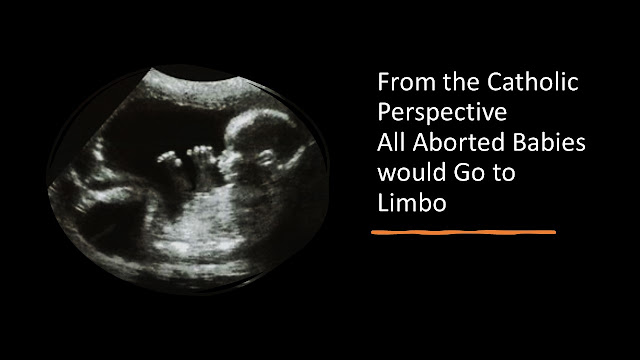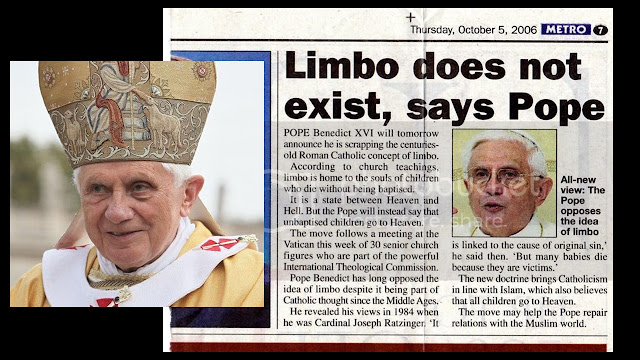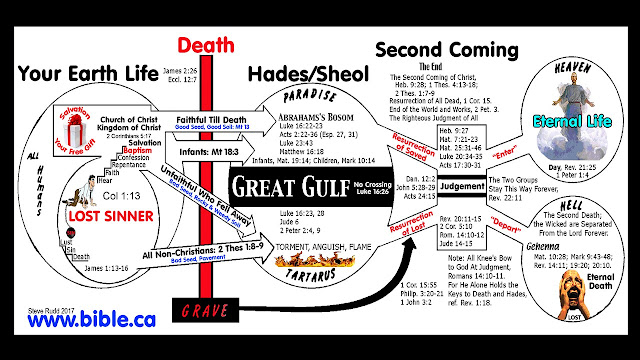Since death is a reality for everyone, “life after life” is a valid question for most, which we are exploring in this two-part study, this being part 2. The thought of death scares most people, because it’s seen as cutting life too short. Catholics go a step further than Protestants in answering that question, because for them it may also be a place called Purgatory, covered last week. They also believe in a place called Limbo for the unbaptized. Atheists just don’t know or perhaps it’s nothing or nowhere. From the Protestant point of view, there is only heaven or hell.
What is Limbo? Where is it? The apostles don’t give even a hint of such a place in any of the N.T. letters (i.e., epistles). When Jesus died on the cross, His closing words noted in John 19:30 were “It is finished.” Why then would we still have a remnant of sin tarnishing Christian souls, be they Protestant or Catholic? We wouldn’t. Why would some be eternally destined for a place, even a paradise, away from God, especially infants? It took a little longer than I anticipated to cover this topic, but better too much than too little.
The slide describes Limbo from a Catholic perspective. I’m not sure how you find a border between heaven and hell as noted. Bottom line, it is very problematic to even attempt to pin-point what is described as Limbo. It was refuted during the Protestant Reformation by the Reformers, including Martin Luther and John Calvin. Even Pope Benedict XVI, in 2017, denied Limbo for infants, much to the surprise of Catholic cardinals, bishops and priests who had professed it for generations.
This slide states an official R.C. teachings on Limbo. The Roman Church has always professed that unbaptized infants went to Limbo. Consequently, as a former Roman Catholic, I rushed to have my children baptized as soon after birth as possible. Some define the “Limbo of the Fathers” (following slide) to be Abraham’s bosom, but I don’t see a fit.
In some Catholic commentaries, there is reference to “Limbo of the Fathers” as noted on the slide, which would be equivalent to Abraham’s bosom that Jesus spoke about in Luke 16:22. The general understanding of limbo refers to a permanent place and state of the souls of those who have died without baptism and without mortal sin, particularly the souls of infants. In regard to Abraham’s Bosom, it wasn’t a permanent place, because all the O.T. saints who were there, followed Jesus to heaven. Would infants now occupy that place?
This R.C. doctrine raises the question, regarding an infant who died without baptism: would their body be resurrected when Jesus returns? If so, do they see Jesus? If not, are they only spirits for all eternity like the angels? I have not seen a viable answer on any R.C. forum. I need to refer to Paul’s rebuttal of the Judaizers in Galatians. We are saved by what Jesus did for us, not what we do for Him. Are these babies separated from God for all eternity? On what grounds? Did Christ not die for them? Or only part way and up to a point? What point would that be? Do they reside in Limbo with resurrected bodies or no bodies? Questions, questions, questions.
This was the official position of the Roman Catholic Church until an announcement by Pope Benedict XVI in 2017. More on that later.
If Limbo was true, some Catholics advocating abortion, including the President and Speaker of the House, and other Catholic members of Congress, would believe they were separating those aborted babies from God forever, also in violation of the sixth commandment. Thank God that isn’t the case. Nevertheless, for those that believe in the Catholic teaching of Limbo—until recently, there was no justification for Catholics not to believe in Limbo—what will their excuse be before God? From a Protestant perspective, all aborted babies and miscarriage babies, go to heaven, redeemed in and by Jesus Christ.
Formal definitions of Limbo. As such, Abraham’s Bosom would be Limbo. If true, then Limbo would cease to exist after Jesus descended into what is referred to as hell. Because everyone there was taken to heaven with Him, as such, there could no longer be a Limbo. Did Christ leave it empty for unbaptized infants? Even Pope Benedict XVI had a problem with it as such… (next slide).
This is what the R.C. Church has always taught and what I learned and had believed as a former Catholic, which included 8 years of parochial school. Pope Benedict XVI made an announcement regarding this teaching, which we will look at shortly, that upset many of the Church cardinals, bishops and clergy.
The key words here are “original sin,” inherited from Adam. The R.C. Church teaches that baptism frees us from the debt of original sin, similar in many ways to Judaizes profession regarding circumcision—strongly refuted by the Apostle Paul in Galatians. If we judge by Galatians, we have to reject that belief, since we are saved by grace alone, through faith alone and not religious works of any kind. The very thing Paul argued against was "Christ plus circumcision" for the Jew, and now, the R.C. equivalency of "Christ plus baptism" for the Gentile. Otherwise, we would be saved by what we do, added to what Christ did. Paul took almost an entire letter (Galatians) to refute such a concept.
The Protestant view doesn’t rest on this one verse, but on the very basis of salvation by grace alone, through faith alone, in Christ alone. We are told in Mark 10:14 When Jesus saw this, he was indignant. He said to them, "Let the little children come to me, and do not hinder them, for the kingdom of God belongs to such as these." Also noted as such in Luke 18:16.
Pope Benedict XVI is the first pope that I’m aware of to deny the existence of Limbo, but as stated, only for infants, since the existence of Limbo is not refuted in the article. How will Catholic theologians interpret this? The article also notes efforts to repair relations with the Muslim world. If Jesus is the only way to the Father (John 14:6), how does Christianity mend its relationship with Islam, especially if we profess Christ as the only road to salvation? In John 14:6 KJV: Jesus saith unto him, "I am the way, the truth, and the life: no man cometh unto the Father, but by me."
Here’s one definition of Limbo that refers to it as Abraham’s Bosom. What happens when there’s a new heaven and new earth as we are told in Rev. 21:1 and 2 Pet. 3:13? That this heaven and earth will pass away and there will be a new heaven and new earth. What then happens to Limbo? So, where would those unbaptized souls in Limbo go?
We recite this (as noted on the slide) every time we say the Apostles Creed. My best explanation is from what some Bible scholars tell us, that it signifies that Jesus went to the place of the dead where the O.T. saints resided, and that the hell he descended into was actually Abraham’s bosom—the paradise side of the “place of the dead”, called Gehenne, or Sheol in the O.T. It is also what some Catholic theologians refer to as “Limbo of the Fathers”.
V.43 Jesus assures the thief on the cross that on that very day, he would be with Jesus in paradise. What paradise is that? See next slide for explanation.
Upon His death, Jesus went to that place called Abraham’s bosom or Hades, the same place He told us about in the parable of the Rich man and Lazarus, to comfort and release them to heaven. This took place after His death on the cross, and while His body laid in the tomb.
Abraham’s Bossom, as shown, doesn’t explain or accommodate R.C. Limbo.
I’ll let the slide speak for itself. You can add the “thief” who died alongside of Jesus, to those noted. In the Hebrew Scriptures, the word used to describe the realm of the dead is sheol. It simply means “the place of the dead” or “the place of departed souls/spirits.” The New Testament Greek equivalent of sheol is hades, which also refers to “the place of the dead.” Revelation 20:11–15 gives a clear distinction between hades and the lake of fire. The lake of fire is the permanent and final place of judgment for the lost, what we think of as "hell". Hades, then, is a temporary place. Many people refer to both hades and the lake of fire as “hell,” which causes confusion. Jesus did not go to a place of torment after His death, but to hades to release the souls there, including the beggar Lazarus.
When did Jesus release the souls in Sheol, aka, Abraham’s bosom to heaven? The abode of the saved and the lost are separated by a “great chasm” (Luke 16:26). When Jesus died, He went to the blessed, paradise side of sheol and from there took the believers with Him to heaven (Ephesians 4:8–10).
The captives He led were those in Abraham’s Bosom/Paradise/Hades.
Paul could not tell if he was in his physical body or just a spirit body. The same will be true of those who die and go to heaven, prior to receiving their resurrected bodies when Christ returns. Again, I have to ask about souls that are said to be in Limbo. Would they never have a body? When you overlay Limbo with Scripture, Limbo loses.
The difference between hell and hades is that hades is the place of the lost, where the rich man went, till they are resurrected to face the Lord as Judge and the lake of fire (hell proper) which is the state of the second death so-called (even though the condemned will have resurrected, eternal bodies).
Sheol/Hades was a realm with two divisions—a place of blessing and a place of judgment (Matthew 11:23; 16:18; Luke 10:15; 16:23; Acts 2:27–31). The abodes of the saved and the lost are both generally called “hades” in the O.T. and Gospels. The abode of the saved is also referred to as “Abraham’s bosom” (KJV) or “Abraham’s side” (NIV) in Luke 16:22; and “paradise” in Luke 23:43.
What about hell? It’s existence is affirmed by both Catholics and Protestants. The lake of fire is the permanent and final place of judgment for the lost. Hades, then, is a temporary place.
What is noted on the slide is what is generally referred to as the last days in the Book of Revelation. This covers both domains, which would include Limbo (if it existed & it doesn’t), and all those who had died. No mention of a what could be constituted as Limbo, especially for unbaptized infants.
There are only two eternal destinations, heaven and hell—no Limbo, no Purgatory. The key to heaven is faith in Jesus Christ, repenting of our sins because He paid the price. Salvation is by grace alone, through faith alone, in Christ alone. Hell awaits all those who do not profess Christ, who at one time willingly rejected or knowingly ignored the mention of Him. God has not hide Jesus, for He is openly presented on radio and TV 24/7. No one will be able to say, “they didn’t know.” What about predestination? All would be lost if God didn’t rescue the elect (a future study).
Additional food for thought for those interested in the details, noting Bible references regarding what happens after life. And yes, it is “from life to life” and not “from life to nothing”. As we are told by Jesus in the parable of the wheat, not everyone who hears the Gospel message and proclaims Christ, do in fact sustain Christ (Luke 8”11-15). They were never born again by the Holy Spirit, and consequently, their interest diminishes and they drop away.
Last blog posting for the year. Wishing each of you and yours a joyful and blessed Christmas Season and a Happy New Year.
The End




























